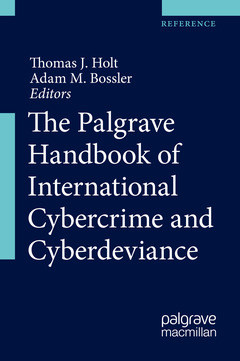The Palgrave Handbook of International Cybercrime and Cyberdeviance, 1st ed. 2020
Coordonnateurs : Holt Thomas J., Bossler Adam M.

This Major Reference Work synthesizes the global knowledge on cybercrime from the leading international criminologists and scholars across the social sciences. The constant evolution of technology and our relationship to devices and their misuse creates a complex challenge requiring interdisciplinary knowledge and exploration. This work addresses this need by bringing disparate areas of social science research on cybercrime together. It covers the foundations, history and theoretical aspects of cybercrime, followed by four key sections on the main types of cybercrime: cyber-tresspass, cyber-deception/theft, cyber-porn and obscenity, and cyber-violence, including policy responses to cybercrime. This work will not only demonstrate the current knowledge of cybercrime but also its limitations and directions for future study.
Foundations of Technology Use/Abuse and the Criminal Justice System.- Defining cybercrime.- Historical evolutions of Cybercrime: From Computer Crime to Cybercrime.- Legislative frameworks in dealing with cybercrime.- The USA.- The UK.- The EU Convention on Cybercrime.- Asia.- Cybersecurity as an industry.- Technology use, abuse, and public perceptions of cybercrime.- Cyberwarfare and nation-state threats.- The interplay of police and extralegal organizations to combat cybecrime.- Forensic evidence and cybercrime.- Organized Crime and Cybercrime.- The Dark Web as a Platform For Crime.- Criminological Theory and Cybercrime.- Social Learning.- Subcultural Theory.- The General Theory of Crime.- General Strain Theory and Cybercrime.- Digital Drift.- Space Transition Theory.- Routine Activities.- Rational Choice.- Deterrence.- Psychological theories and cybercrime (Cyberpsychology).- Internet Addiction and Cybercrime.- Critical Theories and Cybercrime.- Cyber-Tresspass.- Computer Hacking and the Hacker Subculture.- Insider Threats, Outsiders, and Nation-States.- Global Voices in Hacking (Multi-national views).- Hactivism and Cause Based Hackers.- Malicious software threats.- Cybercrime as service operations.- Cyber-Deception and Theft.- Data Breaches and Carding.- Social Engineering.- Identity Theft and Identity Crimes: Global Perspectives.- Romance Scams.- Nigerian Email Schemes.- Phishing and Financial Manipulation.- Digital Piracy as a Social Problem.- Legal Responses to Piracy.- Counterfeiting Products Online.- Cyber-Porn/Obscenity.- Historical Challenges of Technology and Pornographic Content.- Sexual Subcultures and On-line Spaces.- Dating and sexual relationships in the age of the Internet.- Sexting and Social Concerns.- Zoophilia.- BDSM and the Internet Age.- Child Pornography and Child Sexual Exploitation Frameworks.- The Rise of Sex Trafficking On-Line.- Camming and Capping.- Cyber-Violence.- Cyberbulling.- Online Harassment.- Cyberstalking.- Intimate Partner Violence and the Internet: Perspectives.- Technological Facilitation of Gang Activity and Violence.- Hate Speech in Online Spaces.- The Role of Technology in Facilitating Terror and Extremism on and offline.- Suicidal Ideation and Online Platforms.- Cyberwarfare as realized conflict.- Theorizing The Future of Cybercrime.- Criminal Social Networks and the Internet.- Police Legitimacy in the Age of the Internet.- Transforming Punishment as a Function of Technology.- The Rise of Cyberwarriors in Nation-State Relationships.- The Future of Criminological Theory and Cybercrime.- Technological Adoption and Cybercrimes.
Thomas J. Holt is a professor in the School of Criminal Justice at Michigan State University, and his research focuses on cybercrime, cyberterrorism, and police responses to these phenomena.
His work has been published in various peer reviewed journals including British Journal of Criminology, Crime and Delinquency, Deviant Behavior, and Terrorism and Political Violence. He has co-authored multiple books including Cybercrime and Digital Evidence: An Introduction, and Cybercrime in Progress: Theory and Prevention of Technology-Enabled Offenses. Dr. Holt is also a fellow at the Netherlands Institute for the Study of Crime and Law Enforcement, a founding member of the European Society of Criminology’s working group on cybercrime, and the director of the International Interdisciplinary Research Consortium on Cybercrime, a global association of scholars in the social and technical sciences whose research considers cybercrime and cybersecurity.Prof. Adam M. Bossler Dr. Adam M. Bossler is Professor and Chair of Criminal Justice and Criminology at Georgia Southern University. He earned his doctorate in criminology and criminal justice from the University of Missouri–St. Louis. Dr. Bossler is an active member of the International Interdisciplinary Research Consortium on Cybercrime (IIRCC) as well as the European Society of Criminology’s Working Group on Cybercrime.
Adam M. Bossler is Professor and Chair of Criminal Justice and Criminology at Georgia Southern University. He earned his doctorate in criminology and criminal justice from the University of Missouri–St. Louis. Dr. Bossler is an active member of the International Interdisciplinary Research Consortium on Cybercrime (IIRCC) as well as the European Society of Criminology’s Working Group on Cybercrime.
Bossler teaches courses in policing, cybercrime, and criminal behavior. His research primarily focuses on examining the application of traditional criminological theories to vario
Offers an international overview of cybercrime and its various forms, from cyberbullying and identity crimes to hacktivism and sex trafficking
Charts the ever-increasing inquiry into cybercrime and the shifts in focus that have taken place
Brings together research from Criminology, Sociology, Psychology, and Computer Science
Illustrates the benefits of Computer Science and Social Science methodologies working together to improve research
Date de parution : 06-2020
Ouvrage de 1489 p.
15.5x23.5 cm
Thèmes de The Palgrave Handbook of International Cybercrime and... :
Mots-clés :
deviant behavior; cybersecurity; cyberterrorism; crime and technology; social media and crime; policing; online victimisation; computer science; cyber-theft; cyber-porn; cyber-violence; cyber-trespass; cyber-violence; dark web; internet addiction; crime and psychology; cyber attacks; cyberbullying; sex trafficking; victims



